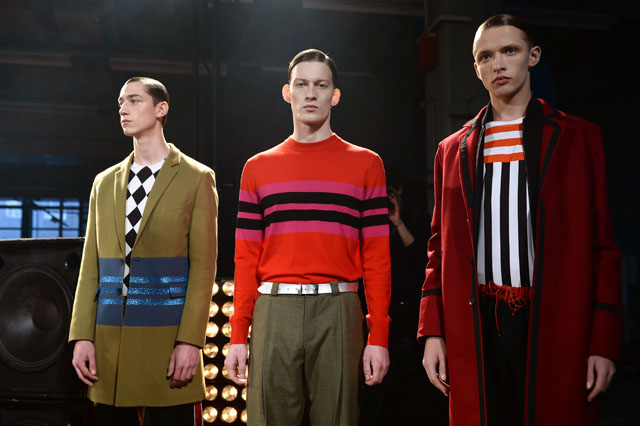The ongoing public reaction to last week’s news stories about the alleged racial profiling of black customers at Barneys New York[1] and Macy’s[2] has been strikingly different, despite the similarity of the circumstances. For the uptown specialty store Barneys, where the staff has been described in the media as “snooty,” there have been hyperbolic calls for heads to roll, with nothing short of a public rending of garments as sufficient apology. A few blocks south at Macy’s in Herald Square, there’s community outrage, but it simmers rather than boils. No public flogging of store staff has been demanded.
The distinction between these two fashion companies appears to be prestige. Based on public reaction, it is a greater transgression to insult a customer who has just finished a ritzy shopping spree than it is to disparage someone who has just spent hard-earned money in America’s department store. The dollar divide reflects our determined use of designer fashion to designate status and privilege. And race makes an already overburdened shopping trip all the more perilous.
In the face of the protests, name-calling and fury, what is it that people really seem to be asking for as recompense? And why do they think Jay Z, in part, can provide it?
Of the multiple profiling cases, which occurred over a span of nine months, the broad strokes are the same. But the bulk of the rage has been on behalf of teenager Trayon Christian, who used his debit card to buy a Ferragamo belt at Barneys New York and was detained by police officers who accused him of making a fraudulent transaction. Christian said he was handcuffed and locked in a holding cell for about an hour before his name was cleared and he was released. He has filed a lawsuit against the store, the police and the city. New York’s attorney general opened investigations of both Barneys and Macy’s. Both stores have denied wrongdoing.
Soon after Christian’s story appeared in New York’s Daily News, Mark Lee, the chief executive of Barneys, publicly apologized. But the firestorm had already begun. Civil rights activist Al Sharpton threatened a boycott, and protesters started a petition demanding that entertainer Jay Z pull out of a planned holiday collaboration with the store. Indeed, within hours, people wanted to know why Jay Z hadn’t issued a statement. Of support. Of condemnation. Of unadulterated disgust. Two days after the first story, when Jay Z still hadn’t stepped forward, he became the poster boy for shameful silence. (He later said he was waiting to hear all the facts.)
In the midst of all this, no one has been screaming for Ferragamo to defect from Barneys. Folks aren’t lashing out at black designers doing business at the store through brands such as Public School or Belstaff. Sharpton is not threatening boycotts and picket lines at Macy’s, even though that company has wrestled with allegations of racial profiling as recently as 2005. And no one was demanding that P. Diddy, who appears in Macy’s advertisements for his Sean John collection, sever his ties with the store.
Racial profiling is indefensible whether it happens on Madison Avenue or in Midtown. But there are clearly other elements fanning the outrage at Barneys.
The company, which specializes in designer brands, has long used exclusivity as part of its marketing strategy — both by intention and default. And the subtext of exclusivity is that poor people, fat people, unattractive people, brown people are not the presumed clientele. If this isn’t the case, the burden of proof rests with the shopkeeper. But it’s not as simple as filling the sales floor with black clerks, crafting a well-worded anti-discrimination policy or even offering an earnest apology. Sensitivity and suspicion run deep. It is positively existential. There’s little benefit of the doubt.
The fashion industry has made it so.
At its highest levels, the industry struggles to increase diversity within its ranks. It commits regular sins of racial insensitivity, including using blackface as an aesthetic flourish. It has undue pride in its commitment to tolerance and acceptance, one that has done well by gay men but remains in dispute when it comes to black people.
Merchandise matters, as well, in this conversation. Barneys created an environment that underscores a rarefied status, whether through tongue-in-cheek, insider humor, cool-as-can-be attitude or a willingness to stock some of the most outre collections.
Years ago, a merchant once referred to edgy, atypical clothes as “dog-whistle” fashion — meaning that it spoke in such high-pitched, distinctive terms that only a select group of people could really understand it. Barneys — home to brands such as Comme des Garcons, Thom Browne and Rick Owens — sells dog-whistle fashion. Whether one will ever buy a $355 black leather Comme des Garcons baseball cap with bunny ears — an actual piece of merchandise — doesn’t matter. The point is that, as a Barneys shopper, you are part of that club. You are part of the fashion conversation that has grown bigger and more vigorous, but not necessarily more welcoming. You get it. And others do not.
Fashion at the Barneys level is not just about being able to afford a $350 Ferragamo belt or a $2,500 Celine bag, which is what a black woman had purchased when she said she was stopped outside the store by police and accused of credit-card fraud. Of course, each of those items, to the logical and sane mind, is ridiculously overpriced. But they are markers of a specific kind of cultural knowledge: clubby, sophisticated, cool, better.
The falsely accused Barneys shoppers were not buying glitzy, ostentatious items. They were not some hip-hop rubes or nouveau-riche big spenders. They didn’t go in for brands known for dealing in overblown logos that can be seen from 50 yards away. They were not buying Gucci, Louis Vuitton or Chanel. They were buying “dog-whistle” fashion.
People have more invested in a trip to Barneys than in a pit stop at Macy’s. The very act of shopping at Barneys is an expression of something beyond just a commercial exchange. And to have a police officer confront a teenager and a mom and say that they are not the people that their choices just confirmed them to be, to tell them that they do not belong — that they are fakers — is an insult that differs from: There’s a problem with your credit card.
Barneys has always used social icons, celebrities, famous misfits and dangerous miscreants to heighten its cultural panache. In recent years, it has collaborated with people such as Lady Gaga and the beer heiress and fashion gadfly Daphne Guinness. This holiday, it’s Jay Z. He is a larger-than-life rapper who wears Tom Ford suits and whose “Picasso Baby” dazzled the intellectual art crowd. Shawn Carter rubs shoulders with the president but sounds like any kid from Brooklyn. He has the credibility of having grown up tough, but now he’s a family man with a baby and a wife who is not some maligned reality TV star but Beyonce — Queen B herself.
For a community scorched by disrespect, Jay Z has taken on the stature of a superhero. He is bigger than Barneys, his cultural currency a thousand times more valuable. And in this situation, where a financial payout will not quiet all the anger and an apology does not soothe all the hurt, Jay Z, people believe, can strike back in a way that really matters. By giving Barneys the cold shoulder, he can declare it uncool, banal and meaningless.
Protesters know such a move would not push the company into bankruptcy, where in fact it once was. But perhaps it would diffuse the brand’s power and even expel it from the club it did so much to create.





0 comments:
Post a Comment
Click to see the code!
To insert emoticon you must added at least one space before the code.